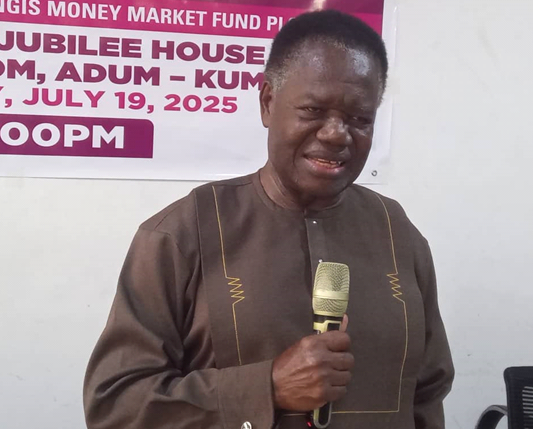By Elizabeth PUNSU, Kumasi
NGIS Money Market Fund PLC has demonstrated strong resilience amid challenging market conditions, recording a solid performance in 2024 despite a slight dip in gross investment income.
At the Fund’s 6th Annual General Meeting (AGM) held in Kumasi, Fund Manager Edward Asamoah reported a marginal decline of 0.87% in gross investment income – from almost GH₵193,500 in 2023 to over GH₵1.18 million in 2024 -mainly due to lower interest rates on money market instruments.
Despite this, operational efficiency remained strong. Administrative expenses dropped by 1.59%, from about GH₵73,600 to just over GH₵72,400. Net investment income however rose by 7.36%, increasing from GH₵1.1million to approximately GH₵1.2million, reflecting the Fund’s ability to improve returns in a tightening rate environment.
The Fund’s liabilities grew by 35.67%, reaching over GH₵84,000. Investor redemptions declined by 6.45% to a little over GH₵2.4million while share sales surged by 48.45%, climbing from GH₵2.3million to above GH₵3.4million – signalling rising investor confidence.
The Net Asset Value (NAV) per share rose from GH₵2.0080 to GH₵2.0435, with the Fund delivering a competitive yield of 17.56%.
As at year-end, the Fund’s portfolio included cash and equivalents of GH₵340,000, short-term investments nearing GH₵7.6 million, medium-term investments of GH₵705,000 and other assets of just over GH₵1million – reflecting a balanced strategy between liquidity, risk and return.
Looking ahead, Mr. Asamoah said the Fund is well-positioned to benefit from expected improvements in Ghana’s macroeconomic environment. The World Bank projects GDP growth between 5.5% and 6% in 2025, driven by gains in services and agriculture.
Inflation is expected to ease toward government’s 10–15% target, aided by continued monetary tightening. While interest rates are likely to remain high in the short-term, gradual cuts may follow if inflation and currency stability improve.
Investor sentiment is expected to improve with progress in debt restructuring and ongoing economic reforms, particularly in infrastructure, energy and financial services. However, global uncertainties and domestic fiscal management remain key risks.
Mr. Asamoah stated that the Fund will continue with its prudent investment approach while exploring new opportunities to grow shareholder value.
Chairman of the Board, Professor Kwaku D. Kessey, reaffirmed the Fund’s commitment to capital preservation and delivering stable, risk-adjusted returns.
He noted that the Fund revised its portfolio strategy in 2024, focusing more on managing interest rate risk, particularly on Post-Domestic Debt Exchange (DDEP) Bonds. Though returns were modest, Prof. Kessey said this laid a foundation for stronger growth in 2025.
The Fund’s Investment and Risk Committee is also exploring new risk-free instruments to boost returns. He highlighted recent improvements in digital access, customer service and transparency.
Prof. Kessey stressed the importance of cental bank policy – especially regarding interest rates and currency stability – and assured stakeholders that the Fund will adapt its strategy in line with these developments.










